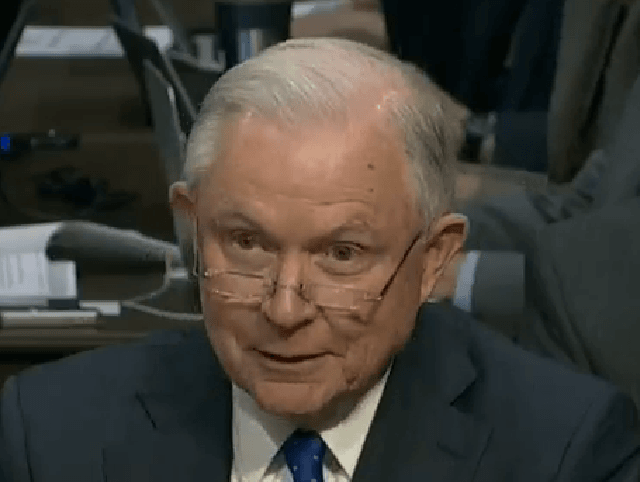Sens. Patrick Leahy (D-VT) and Al Franken (D-MN) again pressed Attorney General Jeff Sessions on his contact with Russian officials Wednesday in an apparent attempt to revive the “Russian collusion” narrative rapidly fading into obscurity.
“Later in March, when you did disclose such meetings, you said you did not recall what was said at the meetings,” Leahy told Sessions, as the attorney general testified before the Senate Judiciary Committee.
In fact, Leahy’s portrayal of events is inaccurate. At the March press conference following the Washington Post report that first indicated Sessions had seen Russian Ambassador Sergei Kisylak on two occasions after denying Russian contacts, once at his office and once at the Republican National Convention (RNC), Sessions did discuss the contents of those meetings. His description of the of 2016 office meeting was hardly a blanket statement that he “did not recall.” “I don’t remember a lot of it, but I do remember saying I’d gone to Russia with a church group in 1991 … we talked about a little bit about terrorism as I recall. And somehow the subject of the Ukraine came up,” he told reporters as he acknowledged the meeting.
“I don’t recall, but most of these ambassadors are pretty gossipy and they like to — this was in campaign season, but I don’t recall any specific political discussions,” Sessions said of the RNC meeting, which was an informal, off-hand conversation in public after Sesssions addressed the convention.
Leahy was the senator who, during Sessions’s confirmation hearing in January, posed, in writing, a question on whether the then-senator had “been in contact with anyone connected to any part of the Russian government about the 2016 election, either before or after election day.” At the time, Sessions answered, simply, “no.”
Wednesday, the liberal senator was rehashing the same lines of attack used in both March, after the Washington Post report, and June, when virtually every Democrat and several Republicans at a hearing of the Senate Intelligence Committee asked Sessions about the disparity.
“Now I never accused you of colluding with Russians, but you clearly … concealed you contact with Russian officials,” Leahy told Sessions, but then proceeded to badger the attorney general about discussing “emails” and “Russian interference” with Russian officials.
Leahy’s colleague Sen. Franken, who has also been on the warpath after getting a negative answer on “Russian contacts” at Sessions’s confirmation hearing, also tried to bring Sessions back into the Russia mire. Devoting his entire question time to Russia, Franken claimed the Department of Justice “declined to comment on the veracity” of a July report by the Washington Post that intelligence intercepts indicated Sessions had briefly met with Kislyak at an event at Washington’s Mayflower Hotel in April 2016.
Not only did the Washington Post piece Franken referenced contain only a statement from Justice Department Spokeswoman Sarah Isgur Flores that she could not “comment on the reliability of what anonymous sources describe in a wholly uncorroborated intelligence intercept that the Washington Post has not seen and that has not been provided to me,” but Sessions extensively addressed the meeting at the Senate Intelligence Committee hearing in June.
“Prior to the speech, I attended a reception with my staff that included at least two dozen people and President Trump,” Sessions said then. “Though I do recall several conversations I had during that pre-speech reception, I do not have any recollection of meeting or talking to the Russian Ambassador or any other Russian officials.”
Neither these answers nor their repetition was enough to quench Franken’s thirst for “Russia story.” “They’re gonna cut me off,” Franken protested before securing another three minutes with which to accuse Sessions of misleading him.
“You have now gone through this long talk that I believe is totally unfair to me,” Sessions told Franken, giving an extended account of his having denied meeting with “the Russians” as a surrogate of the Trump campaign one last time. “So now you take that and say if I ever met with a Russian, I’ve not been candid with the committee. And I reject that.”

COMMENTS
Please let us know if you're having issues with commenting.